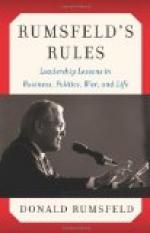The difficult problem of which General Buller is now giving his solution has been created for him by the Government, which from June to October was playing with a war which according to its own admissions it did not seriously mean. “Mistakes in the original assembling of armies can hardly be repaired during the whole course of the campaigns, but all arrangements of this sort can be considered long beforehand and—if the troops are ready for war and the transport service is organised—must lead to the result intended.” So wrote Moltke in 1874 in one of the most famous passages ever published. If last spring the Government or even the Secretary of State for War alone had been in earnest, had been doing what plain duty required, the nature and conditions of the South African war would have been thought out, and the military judgment which was to conduct it would have been set to devise the proper opening. That would have consisted in landing simultaneously, thirty thousand men at Durban and forty thousand at the Cape. These forces would not have moved forward until they were complete and ready, and though the Boers might meantime have overrun their borders, the British advance when it came would have been continuous, irresistible, and decisive. Instead of that the Government gave the Boers notice in June that there might be war, so that the Boers had the whole summer to get ready.
When in September the Government began to think of action the only idea was defending Natal. But this defence was not thought of as part of a war. The idea never seems to have occurred to the Government that the need for defence in Natal could not arise except in case of war, and that then to defend Natal would be impracticable except by beating the Boer army. Accordingly, the handful of troops in Natal were posted without regard to the probable outlines of the war, and therefore, wrongly posted. The consequence was that when war came they could not be concentrated except at the cost of fighting and loss, and of a retreat which gave the enemy the belief that he had won a victory. Even then the point held—Ladysmith—was too far north and liable to be turned. All these mistakes, made before Sir George White arrived, were evident to that general when he first reached Ladysmith, but they could not then be remedied, and he had to do, and has done, the best he could in the circumstances. The fact of Sir George White’s investment compels Sir Redvers Buller to begin his campaign with the effort to relieve him, and the fact that Kimberley is held by a weak force compels him to divide his force when his one desire certainly must have been to keep it united. In the expected battle at Mooi River Sir Redvers Buller will be trying to make up for the faulty arrangements of September. The desire to hold as much of the railway as possible—also due to the false position of Sir George White’s force—has, perhaps, led General Hildyard to spread out his force over too long a line. But, in spite of the difficulties created by errors at the start, I am not without hopes that these remarks will soon be put out of date by a decisive British victory.




